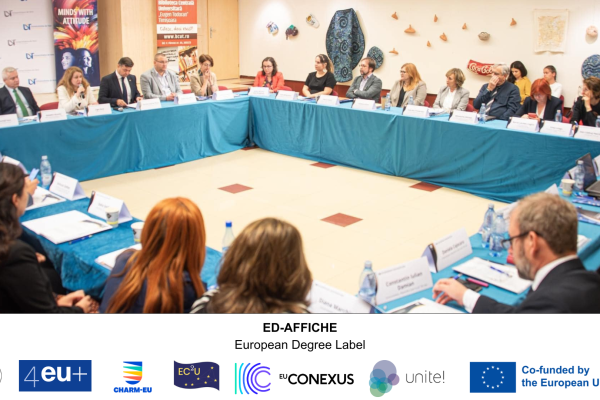
The ED-AFFICHE consortium is composed of six leading European Universities alliances, Una Europa, 4EU+, CHARM-EU, EC2U, EU-CONEXUS, and Unite!, representing a total of 51 higher education institutions from 22 different countries. The consortium is furthermore supported by 19 national and regional ministries in charge of higher education, as well as 15 national accreditation and quality assurance agencies. Furthermore, ED-AFFICHE actively engages various stakeholders, including students, university staff, and employers, to gather insights from all relevant parties in order to enhance and advance the European degree label, ensuring it delivers added value compared to traditional joint degrees.
Over the past months, the project has systematically gathered feedback on the European degree label initiative from students, joint programme directors and coordinators, employers, and quality assurance agencies. This feedback has been meticulously analysed within the framework of the ED-AFFICHE “Comparative analysis of the criteria associated to the European Degree label and the process behind it”. These insights will form the foundation for proposing developments and improvements to the criteria, thereby contributing to the continuous enhancement of the European degree label.
These perspectives were acquired through a diverse set of targeted questionnaires, complemented by online focus groups specifically designed for university staff. In addition, the ED-AFFICHE team gathered insights on the criteria and potential verification methods during the ED AFFICHE mid-term event titled “Advancing the European Degree Label”. This event brought together the project’s associated partners, other pilot projects, and representatives from the European Commission, fostering a comprehensive exchange of views.
Recommendations on Criteria:
The insights gathered from various stakeholders and associated partners have been meticulously analysed and compiled in the document provided here. These findings will serve as a source of inspiration for ED-AFFICHE in refining the criteria, a process set to be presented to universities, national authorities, students, employers, and quality assurance agencies in the coming weeks for their input. Subsequently, the refined criteria will be shared with the European Commission.
Regarding the mandatory criteria, the prevailing sentiment is that they should be maintained but with enhanced clarification and guidelines. Conversely, the optional criteria are deemed irrelevant and, as such, are recommended for removal. Notably, certain optional criteria, such as those related to digital skills associated with the label and increased collaboration with labour market actors, are viewed as highly pertinent by stakeholders. In response, ED-AFFICHE will propose incorporating these criteria into the mandatory set, aligning with the perspectives of the stakeholders.
Finally, the refinement of the criteria will place increased emphasis on the incorporation of European values within the joint program seeking the label.
Debate on Accreditation and QA Processes:
The development of the European Degree Label has been marked by the debate on the body responsible for verifying compliance with criteria for international joint programmes seeking the label. Two main perspectives have emerged: one supporting a national-level verification process with an emphasis on transparency and uniformity, proposing a detailed rephrasing of criteria and the introduction of indicators. The alternative viewpoint advocates for a centralized European approach, asserting that this is essential for securing clear added value. In this second scenario, feasibility should be achieved through streamlining the process and allocating dedicated funding for higher education institutions.
In the weeks ahead, the ED-AFFICHE team will actively collaborate with associated Quality Assurance agencies to explore and determine the most effective verification methods for the European Degree label. The insights gained from these discussions will be incorporated into the final recommendations.
If you notice any issues with the layout, content, or functionality of the page, please let us know.
Your input helps us improve and ensures a better experience for everyone.

Funded by the European Union. Views and opinions expressed are however those of the author(s) only and do not necessarily reflect those of the European Union or the European Education and Culture Executive Agency (EACEA). Neither the European Union nor EACEA can be held responsible for them.